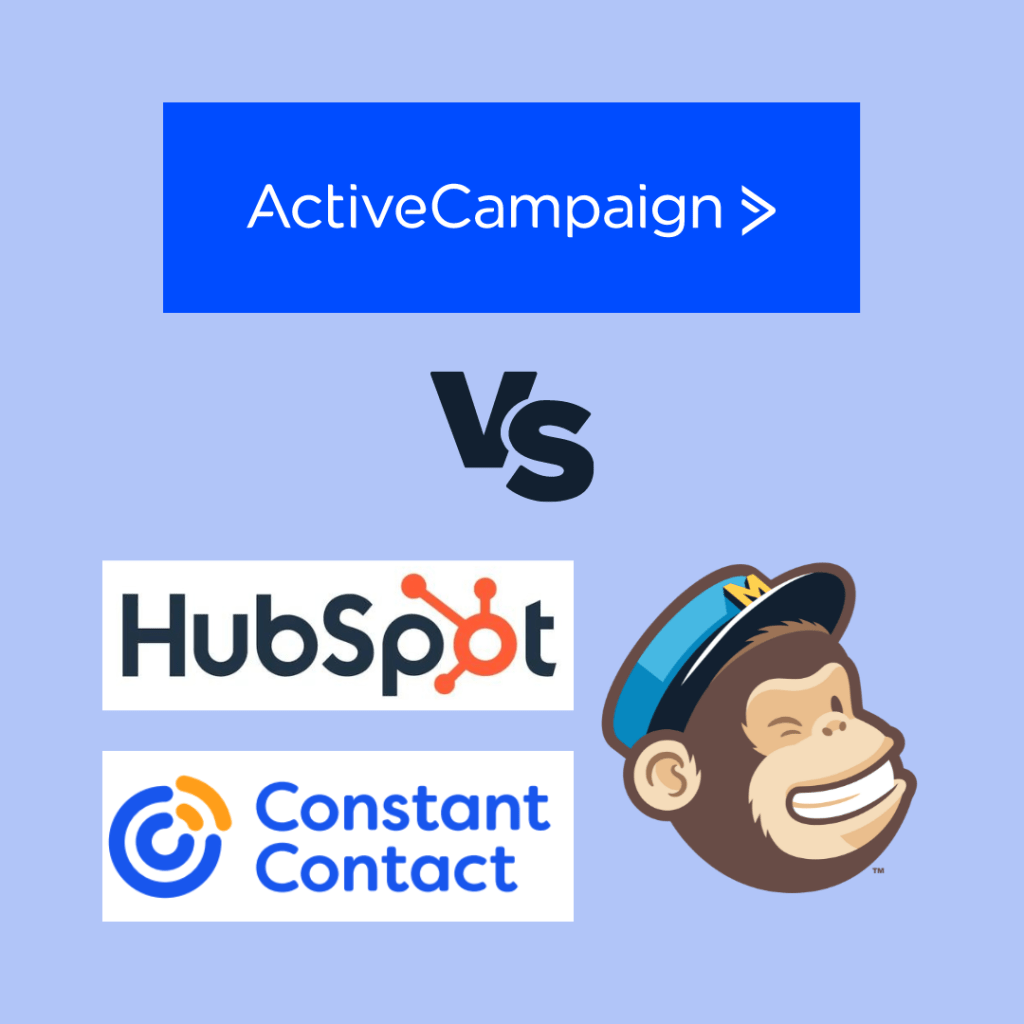When it comes to email marketing, choosing the right platform can make or break your campaigns. With so many options available, it’s crucial to find a solution that not only meets your current needs but also scales with your business as it grows. ActiveCampaign is often mentioned as one of the top choices for email marketing, but how does it really stack up against the competition? In this blog post, we’ll compare ActiveCampaign with some of its key competitors to help you understand why it stands out as the best choice for email marketing.
We’ll cover the platform’s unique features, highlight its strengths and weaknesses, and provide practical insights that will help you make an informed decision. Whether you’re a small business owner, a marketer, or an entrepreneur, this comparison will guide you toward the best email marketing solution for your needs.
Why ActiveCampaign is a Top Contender
ActiveCampaign is more than just an email marketing tool—it’s an all-in-one customer experience platform that combines email marketing, automation, CRM, and machine learning to create personalized and targeted campaigns. Here’s why it’s considered a leader in the industry:
- Advanced Automation Capabilities: ActiveCampaign offers powerful automation features that allow you to create complex workflows with ease.
- Comprehensive CRM Integration: The built-in CRM lets you manage your sales pipeline alongside your email marketing efforts.
- User-Friendly Interface: Despite its advanced features, ActiveCampaign remains intuitive and easy to use.
- Scalable Pricing Plans: ActiveCampaign offers flexible plans that cater to businesses of all sizes, from startups to enterprises.
- High Deliverability Rates: The platform is known for its high deliverability, ensuring that your emails reach the inbox.
ActiveCampaign vs. Competitors: Feature Comparison
Let’s dive deeper into how ActiveCampaign compares with some of its key competitors: Mailchimp, HubSpot, and Constant Contact. We’ll examine the features that matter most to businesses and marketers.
1. Automation
ActiveCampaign:
ActiveCampaign excels in automation, offering highly customizable workflows that can be triggered by a wide range of actions. You can create complex, multi-step automations that include conditional logic, dynamic content, and lead scoring. This makes it ideal for businesses looking to automate their customer journeys with precision.
Mailchimp:
Mailchimp offers basic automation features that are suitable for simple workflows, such as welcome emails and abandoned cart reminders. However, it lacks the depth and flexibility that ActiveCampaign provides, making it less suitable for businesses with advanced automation needs.
HubSpot:
HubSpot offers robust automation capabilities similar to ActiveCampaign, but it’s often more expensive. While HubSpot’s automation is powerful, it’s closely tied to its CRM, which can be overkill for businesses that don’t need a full-blown CRM solution.
Constant Contact:
Constant Contact’s automation features are limited compared to ActiveCampaign. It’s better suited for basic email campaigns and lacks the advanced workflow options that ActiveCampaign users enjoy.
Winner: ActiveCampaign
Expert Tip: If automation is a critical part of your email marketing strategy, ActiveCampaign’s robust features make it the clear choice. Start with simple workflows and gradually build more complex automations as your needs evolve.
2. CRM Integration
ActiveCampaign:
ActiveCampaign’s built-in CRM is seamlessly integrated with its email marketing and automation features. This allows you to track contacts, manage deals, and automate follow-ups all within one platform. The CRM is designed to work hand-in-hand with your email marketing efforts, providing a 360-degree view of your customer interactions.
Mailchimp:
Mailchimp lacks a built-in CRM, which can be a significant drawback for businesses that require sales and marketing alignment. While it does offer basic contact management features, you’ll need to integrate with a third-party CRM for more advanced needs.
HubSpot:
HubSpot is well-known for its CRM, which is free and packed with features. However, the full power of HubSpot’s CRM and automation comes at a higher cost, making it less accessible for smaller businesses.
Constant Contact:
Constant Contact does not include a built-in CRM, requiring users to rely on third-party integrations. This can be cumbersome and may lead to data silos, making it harder to manage customer relationships effectively.
Winner: ActiveCampaign
Real-World Example: A small B2B company used ActiveCampaign’s CRM to track customer interactions, automate follow-ups, and manage their sales pipeline. This integration helped them close deals 25% faster compared to their previous setup with a separate CRM and email marketing tool.
3. Segmentation and Personalization
ActiveCampaign:
ActiveCampaign offers advanced segmentation and personalization features, allowing you to create highly targeted campaigns. You can segment your audience based on behavior, demographics, purchase history, and more. The platform’s dynamic content feature lets you personalize different parts of your email based on subscriber data.
Mailchimp:
Mailchimp provides basic segmentation and personalization, but it doesn’t offer the same level of granularity as ActiveCampaign. While you can segment your audience and personalize emails, the options are more limited.
HubSpot:
HubSpot also offers strong segmentation and personalization features, but like its automation and CRM, these come at a higher price point. HubSpot’s personalization is powerful but may be overkill for smaller businesses.
Constant Contact:
Constant Contact’s segmentation and personalization options are basic, making it less suitable for businesses that want to create highly tailored campaigns.
Winner: ActiveCampaign
Suggestion: Leverage ActiveCampaign’s advanced segmentation and personalization features to send more relevant content to your subscribers. For example, use purchase history data to recommend products or services that match the customer’s interests.
4. Ease of Use
ActiveCampaign:
Despite its advanced features, ActiveCampaign maintains a user-friendly interface that makes it accessible to both beginners and experienced marketers. The drag-and-drop builder, pre-designed templates, and intuitive workflow editor simplify the process of creating and managing campaigns.
Mailchimp:
Mailchimp is well-known for its ease of use, making it a popular choice for beginners. The platform is straightforward, but its simplicity comes at the cost of limited features, especially as your business grows.
HubSpot:
HubSpot is feature-rich but can be overwhelming for new users. The platform’s complexity means there’s a steeper learning curve, especially if you’re using its CRM and marketing tools together.
Constant Contact:
Constant Contact is easy to use, but its limited features mean it’s better suited for basic campaigns. It’s a good choice for those who want simplicity but don’t need advanced tools.
Winner: ActiveCampaign (for those needing a balance of features and ease of use)
Expert Advice: If you’re new to email marketing, ActiveCampaign’s user-friendly interface will help you get started quickly, while still offering the advanced features you’ll need as your business grows.
5. Pricing and Scalability
ActiveCampaign:
ActiveCampaign offers flexible pricing plans based on the number of contacts and features you need. This makes it accessible to businesses of all sizes, from startups to large enterprises. The platform scales with your business, allowing you to add more contacts and features as needed.
Mailchimp:
Mailchimp’s pricing is affordable for beginners, but it can become expensive as your list grows or as you need more advanced features. The free plan is limited, and the cost of add-ons can add up quickly.
HubSpot:
HubSpot’s pricing is on the higher end, especially if you need access to its full suite of marketing, sales, and CRM tools. While the CRM is free, the cost of marketing automation and advanced features can be prohibitive for small businesses.
Constant Contact:
Constant Contact offers straightforward pricing, but the platform’s limited features mean you may need to invest in additional tools to meet your needs. It’s a good choice for small businesses with basic email marketing needs, but it may not scale well.
Winner: ActiveCampaign
Real-World Example: A growing e-commerce brand chose ActiveCampaign for its scalability. They started with a basic plan and gradually upgraded as their email list and automation needs expanded. The flexible pricing allowed them to scale without switching platforms.
Pros and Cons of ActiveCampaign vs. Competitors
While ActiveCampaign offers many advantages, it’s essential to weigh the pros and cons against its competitors.
Pros:
- Advanced Automation: ActiveCampaign’s automation capabilities are unmatched, offering flexibility and depth.
- Integrated CRM: The built-in CRM provides seamless sales and marketing alignment.
- Scalable Pricing: ActiveCampaign’s pricing is flexible and grows with your business.
- High Deliverability: The platform’s high deliverability rates ensure your emails reach the inbox.
Cons:
- Learning Curve: While user-friendly, mastering ActiveCampaign’s advanced features may take time.
- Higher Cost for Advanced Features: Some features, like lead scoring and predictive sending, are only available in higher-tier plans.
FAQs About ActiveCampaign vs. Competitors
1. Is ActiveCampaign suitable for small businesses?
Yes, ActiveCampaign offers scalable pricing plans that make it accessible to small businesses. Its user-friendly interface and comprehensive features ensure you get the most value as you grow.
2. How does ActiveCampaign compare to Mailchimp?
ActiveCampaign offers more advanced automation, CRM integration, and segmentation features than Mailchimp. While Mailchimp is easier to use for beginners, ActiveCampaign is better suited for businesses that need powerful marketing automation.
3. Can ActiveCampaign replace my CRM?
Yes, ActiveCampaign’s built-in CRM allows you to manage your sales pipeline alongside your email marketing efforts, making it a viable replacement for standalone CRM tools.
4. How does ActiveCampaign’s pricing compare to HubSpot?
ActiveCampaign is generally more affordable than HubSpot, especially for small to mid-sized businesses. While HubSpot offers a free CRM, its marketing automation tools are more expensive.
5. What makes ActiveCampaign’s automation better than its competitors?
ActiveCampaign’s automation is highly customizable, allowing you to create complex workflows with conditional logic, dynamic content, and lead scoring—all of which are more advanced than most competitors’ offerings.
Conclusion
ActiveCampaign stands out as the best choice for email marketing due to its advanced automation capabilities, integrated CRM, user-friendly interface, and scalable pricing. While competitors like Mailchimp, HubSpot, and Constant Contact offer valuable features, ActiveCampaign’s balance of power and ease of use makes it the top choice for businesses looking to grow their email marketing efforts.
By choosing ActiveCampaign, you’re investing in a platform that will not only meet your current needs but also scale with you as your business evolves. Whether you’re a small startup or a large enterprise, ActiveCampaign provides the tools and flexibility you need to succeed in today’s competitive digital landscape.



